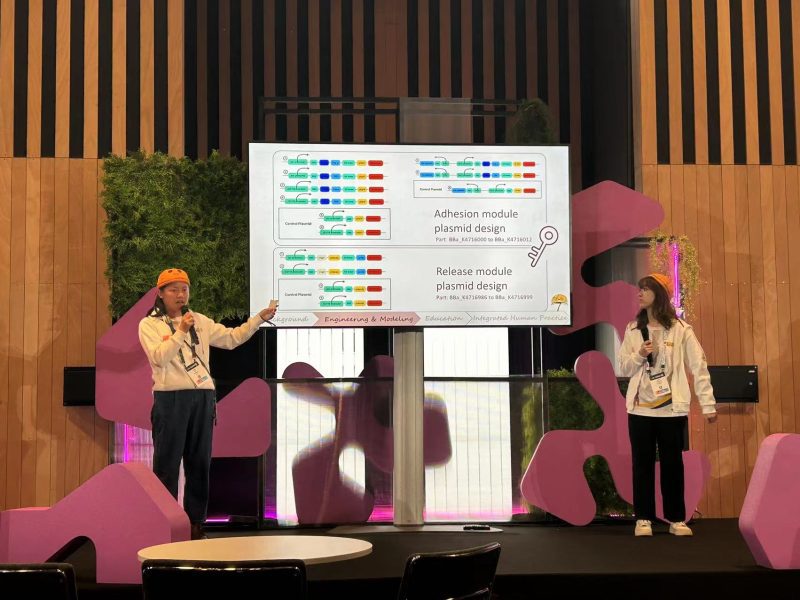News Express: UM students honoured with award at international competition on genetic engineering
新聞快訊:澳大學生於基因工程國際賽奪獎

澳大團隊演講
The UM team gives a presentation
澳大學生於基因工程國際賽奪獎
澳門大學健康科學學院和科技學院的本科生研究團隊到巴黎參加“2023國際基因工程機器大賽”(iGEM),與來自全球頂尖學府的團隊同場競技,最終憑緩減乳糜瀉(Celiac disease)症狀的研究斬獲銀獎,這是澳大連續五年於該國際合成生物學競賽中獲獎。
今屆iGEM吸引超過65個國家、400多支團隊共3000多名學生參與。澳大學生團隊的研究主要探索乳糜瀉的解決方案。乳糜瀉源自患者攝入含有麩質的食物引發對自身免疫性疾病,具有顯著及長期的後果,包括影響兒童生長、增加貧血和骨質疏鬆等各種疾病的風險。乳糜瀉目前的治療選擇主要包括要求患者終身遵循無麩質飲食及提供口服酶療法,但嚴格的飲食限制給患者生活帶來很大的不便,而且長期消費無麩質食物的成本也相當高昂。在澳大健康科學學院副教授李子安、教授黃值富及副教授郭珩輝的指導下,由28名本科生組成的團隊開展了 “麩質酶腸道守護者(GEIG)”的項目,利用基因工程在細菌建立能分解麩質的酶釋放系統,以一氧化氮傳感器控制的方式對應乳糜瀉疾病腸道內的炎症環境,並控制脯氨酸內切酶的釋放,從而緩減症狀。
團隊利用課餘時間參與項目專案設計、進行實驗,並與香港科技大學、北京師範大學(珠海校區)、深圳大學iGEM團隊在粵港澳大灣區牽頭舉辦首屆合成生物學產學研論壇,以及於內地、澳門中小學的教育活動宣傳腸道疾病的相關知識。團隊隊長、澳大健康科學學院三年級學生廖文煜表示,團隊需要克服諸多從未經歷的難題,但從中大有裨益,不僅提升了專業知識,亦加強了自身的軟實力。
iGEM於2003年在美國麻省理工學院創立,現為全球性比賽。比賽期間,來自世界各地的學生利用他們對合成生物學的知識應對全球性挑戰,展示前沿研究,創造了互利友好且競爭激烈的環境,不僅促進跨領域科學合作,也為公眾提供了展望合成生物學未來的機會。
欲瀏覽官網版可登入以下連結:
https://www.um.edu.mo/zh-hant/news-and-press-releases/presss-release/detail/57211/
UM students honoured with award at international competition on genetic engineering
A team of undergraduate students from the Faculty of Health Sciences (FHS) and the Faculty of Science and Technology of the University of Macau (UM) participated in the International Genetically Engineered Machine (iGEM) Competition 2023 held in Paris. The UM team competed with teams from the world’s top universities and won a silver medal for their research on alleviating the symptoms of coeliac disease. This marks the fifth consecutive year that UM has received an award in the iGEM competition, an international competition on synthetic biology.
This year’s iGEM competition attracted more than 400 teams formed by over 3,000 students from more than 65 countries. The research presented by the UM student team focuses on solutions to coeliac disease, an autoimmune disorder triggered by the consumption of gluten-containing foods. Coeliac disease has significant long-term consequences, including growth impairment in children and an elevated risk of various diseases such as anaemia and osteoporosis. Current treatment options for coeliac disease primarily include a lifelong gluten-free diet and oral enzyme therapy. However, strict dietary restrictions may lead to great inconveniences, and the cost of consuming gluten-free food over the long term can be substantial. Under the guidance of FHS Associate Professor Lee Tsz On, Professor Garry Wong and Associate Professor Kwok Hang Fai, a team of 28 undergraduate students developed a research project called ‘Glutenase Intestinal Guardian (GEIG)’. The team employed genetic engineering techniques to create an enzyme delivery system within bacteria that breaks down gluten. The system, controlled by a nitric oxide sensor, responds to the inflammatory conditions in the intestines of individuals with coeliac disease. By regulating the release of prolyl endopeptidase, it alleviates the symptoms.
The team members dedicated their spare time to project design and conducting experiments. In addition, they held the 1st iGEM Greater Bay Area Synthetic Biology Industry-Academia-Research Forum in collaboration with the iGEM teams from the Hong Kong University of Science and Technology, Beijing Normal University at Zhuhai, and Shenzhen University. They also conducted popularisation activities in primary and secondary schools in the mainland and Macao to raise awareness of gastrointestinal diseases. Liao Wenyu, the team leader and a third-year student in FHS, said that the team had overcome many challenges during the process, from which they had developed their scientific knowledge and improved their soft skills.
The iGEM competition, which was founded in 2003 at the Massachusetts Institute of Technology, is now a global competition. During the competition, student teams from around the world come together to address global challenges through the application of their knowledge of synthetic biology. They showcase cutting-edge research, and foster a mutually beneficial and friendly yet competitive environment. The competition not only promotes interdisciplinary scientific collaborations but also offers the general public an opportunity to envision the future of synthetic biology.
To read the news on UM’s official website, please visit the following link:
https://www.um.edu.mo/news-and-press-releases/press-release/detail/57211/